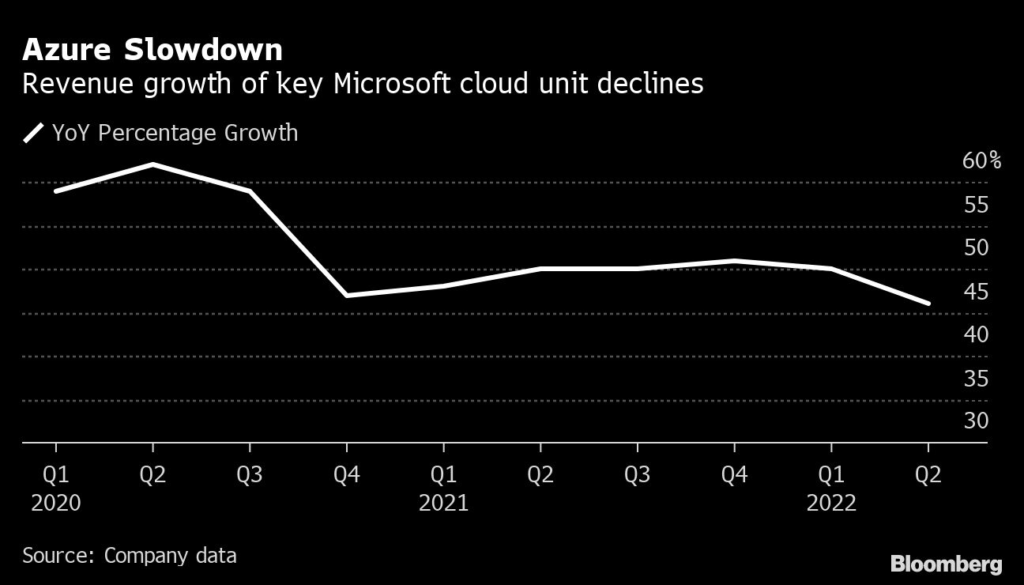(Bloomberg) — Microsoft Corp. shares rose in late trading, reversing an earlier decline, after the software giant gave a forecast that reassured investors the company’s Azure cloud-computing business still has potential to drive growth.
Earlier, Microsoft had reported quarterly sales that topped $50 billion for the first time and profit that exceeded analysts’ estimates, fueled by cloud, gaming and Windows software. Still, Azure revenue decelerated from recent quarters, sending the stock tumbling more than 5%.
Then, on a conference call, the company forecast the closely watched Azure revenue growth rate would pick up in the fiscal third quarter from the second, excluding the impact of currency fluctuations. The stock rose as much as 3.9%. Despite the earlier concerns, the Azure forecast will be “front and center tomorrow morning,” Dan Ives, an analyst at Wedbush, said. “This will help calm Street tech growth worries.”
Investors on Tuesday initially focused on the 46% increase at the company’s cloud unit, which fell short of the rosiest estimates and lagged behind gains for the two prior periods.
Chief Executive Officer Satya Nadella has turned the company’s Azure business into a solid No. 2 behind Amazon.com Inc. in the market for cloud infrastructure services — computing power and storage delivered via the internet — and has made the unit’s results a closely watched number. While cloud revenue has been rising steadily, Microsoft faces steep competition for big contracts from Amazon.com Inc. and Alphabet Inc.’s Google, which ranks third but is pouring resources into the business as it works to catch up.
Microsoft shares dropped about 4.7% in extended trading following the report, after declining 2.7% to $288.49 at the close in New York. While the stock jumped 51% in 2021, it has fallen 14% so far this year amid a rout in large technology stocks.
Though Azure revenue in the fiscal second quarter, which ended Dec. 31, came in below the 50% in the prior period and 51% the quarter before, demand was actually better than Microsoft had expected, Chief Financial Officer Amy Hood said in an interview.
“The continuity of the growth in Azure is actually pretty pleasing to us,” she said. “Customers are turning to Azure and the Microsoft Cloud to really fundamentally run their businesses differently.”
Overall revenue in the quarter climbed 20% to $51.7 billion, the Redmond, Washington-based software maker said in a statement. That was a slight easing from the 22% gain posted in the first quarter, which was the fastest pace in four years. Second-quarter revenue was predicted to be $50.9 billion on average, according to analysts polled by Bloomberg. Net income rose to $18.8 billion, or $2.48 a share, while analysts had predicted $2.32.
“We’ve kind of hit the highest peak of growth we’re going to see in a while,” Brent Thill, an analyst at Jefferies LLC, said before the results were released. “You have a theme of decelerating growth and harder comps are coming up.”
The software giant is one of the first of the largest technology companies to report earnings, so investors are closely watching the results as a bellwether for results from companies like Apple Inc., which will report on Thursday, and Alphabet, which is on tap next week.
“Microsoft is obviously going to be considered a leader,” Thill said. “Their comments about the world will set the stage for the rest of the tech.”
Other technology stocks including Alphabet and Amazon, whose AWS cloud division is its most profitable, reversed their declines in late trading after Microsoft’s forecast. Microsoft’s guidance should calm nerves for investors in those companies as well, Ives said, noting the outlook will be “big for the tech space in this white knuckle environment.”
Commercial cloud sales in the quarter rose 32% to $22.1 billion, Microsoft said. Gross margin, or the percentage of sales left after subtracting production costs, in that business narrowed slightly to 70%, the company said in a slide posted on its website. Without the impact of an accounting change, gross margin would have widened by 3 percentage points.
Intelligent Cloud sales, consisting of Azure and server software, rose to $18.3 billion, meeting the average estimate of analysts polled by Bloomberg. In the Productivity division, mostly Office, sales were also in line with $15.9 billion average prediction.
In the More Personal Computing division, including Windows, Surface and Xbox, revenue was $17.5 billion. That topped the average $16.7 billion projection.
Sales of Office 365 to business customers rose 19%. Revenue from Windows operating-system software sold to PC makers increased 25%, buoyed by strong demand for corporate machines that carry higher-priced versions of Windows, Hood said.
Shortages of semiconductors are still roiling the market for Xbox consoles and Surface devices, but Microsoft and its partners have improved their ability to manage the issues, Hood said, leading to better-than-expected supplies of both categories of hardware in the critical holiday season.
Sales of Xbox machines climbed 4% compared with the year-earlier holiday period, when the new versions of the devices launched but supply was severely limited. Revenue from Xbox content and services jumped 10% in the recent period.
Last week, Microsoft unveiled a deal to acquire Activision Blizzard for $68.7 billion, buying a legendary game publisher responsible for franchises like Call of Duty and World of Warcraft, but recently roiled by claims of sexual misconduct and discrimination. Microsoft will not update any financial information it gave about the deal today, Hood said in the interview.
More stories like this are available on bloomberg.com
©2022 Bloomberg L.P.











